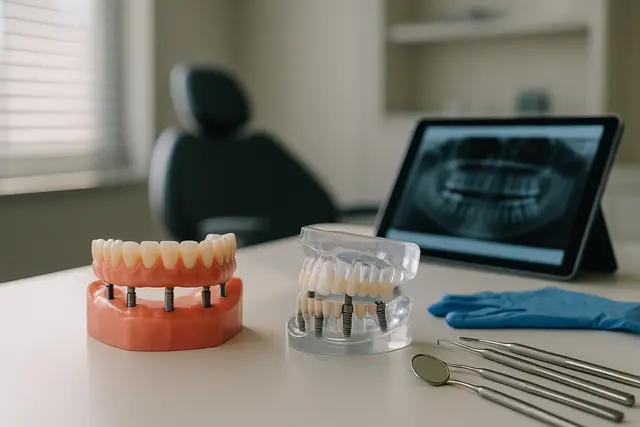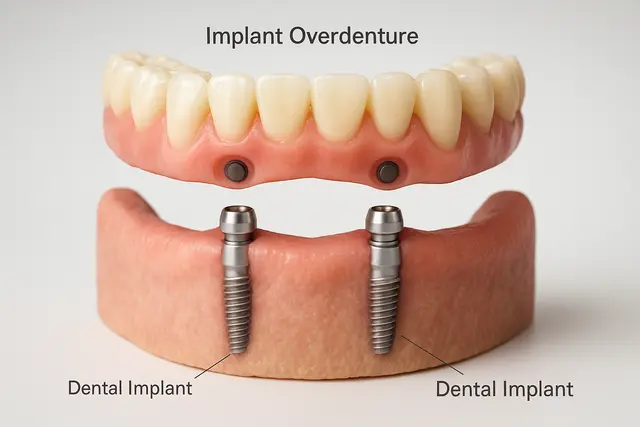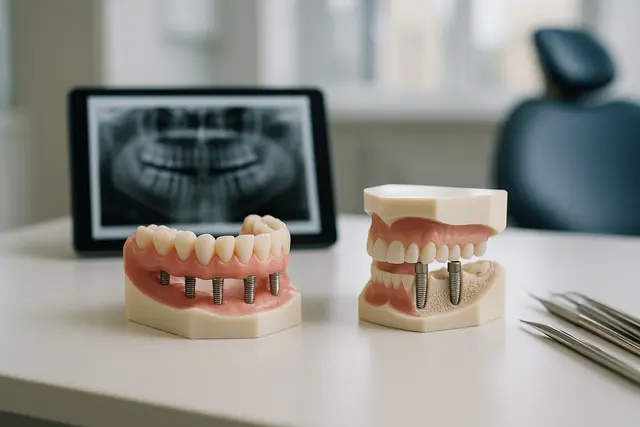Prosthodontics
4 min read
Oct 08, 2025
Dental Implant Procedure Risks Explained
Considering dental implants to replace missing teeth? While they offer a natural look and long-term stability, it’s important to understand both the rewards and the risks involved. This honest breakdown gives you the clarity you need before making a decision.

Dental Implant Basics That Actually Matter
Let’s be real. If you’re looking into getting a dental implant, you’ve probably already seen a few bright, smiling models on a dental clinic website, claiming life has never been better. But what you actually want is the full picture. Not just the shiny results, but the gritty details too. The stuff that helps you make an informed decision.
So here it is: a no-fluff guide to how dental implants work, what they fix, what could go sideways, and why people still love them anyway.
A dental implant is a small titanium post surgically placed into your jawbone to act like a real tooth root. Sounds intense? It kind of is. But also, it's one of the most reliable ways to replace missing teeth and restore your smile, your bite, and, honestly, your confidence.
How Dental Implants Work Inside Your Mouth
Think of the implant like the foundation of a house. It's the part you don’t see but totally rely on. After the implant is placed in your jaw, your body starts a process called osseointegration. That’s a fancy way of saying your bone grows around the implant and locks it in place. If osseointegration is the hero of this story, implant failure is its arch-nemesis.
Once the implant is nice and solid, an abutment (a connecting piece) gets screwed on. Then the crown, aka the pretty fake tooth, is attached to the implant. Voila: artificial teeth that look and feel like the real deal.
Dental Implant Benefits That Make a Real Difference
Why go through dental implant procedures when dentures or bridges exist? Because dental implants don’t slip, don’t click, and don’t get tossed in a cup at night. They’re as close as it gets to the real thing.
You can chew normally again. Talk without worrying about things shifting around. And smile like you mean it. Dental implants can take years off your appearance by keeping your jawbone from shrinking. Yep, implants prevent that sunken-face look that comes with tooth loss.
Plus, with good oral hygiene and regular dental checkups, they’re built to last.
The Risks Associated With Dental Implant Procedures
Like any surgery, dental implant surgery comes with its own list of risks and complications. This isn’t scare tactics, it’s just the truth.
One common risk of implant procedures is infection. Because, well, you’re getting a titanium post screwed into your jawbone. If bacteria sneak into the implant area, it can lead to infection and implant failure.
Other possible risks include:
Nerve damage: Tingling or numbness in your lips, cheeks, or chin if the implant is placed too close to a nerve.
Sinus issues: Especially if implants push into the sinus cavity from the upper jaw.
Understanding Pre-Implant Risk Factors
Planning for dental implant success means understanding the potential risk factors ahead of time. Let’s say your jawbone isn’t thick or strong enough to support an implant. A bone graft may be needed first to build it up. That’s a whole extra procedure.
Health conditions like uncontrolled diabetes can also interfere with healing and increase complication risks.
Other potential complications include:
Gum issues: Infections around the implant that can weaken its support structure.
Smoking: It slows healing and interferes with osseointegration. Most dentists advise quitting beforehand.
Is Dental Implant Failure Really That Common?
Here’s the good news: dental implant success rate is over 95% in healthy patients. But failure does happen, especially if the implant does not fuse properly with the bone. That’s why working with a skilled implant dentist matters.
And keep in mind, failure can happen early, right after placement, or years later if something causes bone loss or infection around the implant.
Dental Implant Complications That Catch People Off Guard
Complications like loose implants, prolonged bleeding, or shifting crowns aren’t always mentioned upfront, but they’re part of the conversation. If an implant is placed poorly or if your bite isn’t aligned correctly, the stress on the implant can increase the risk of failure.
Also, not all implant systems are the same. Cheaper doesn’t always mean better, and some systems just don’t integrate as well as others. Your dentist should walk you through the implant body type and why it’s being recommended.
Dental Implants Work Best With a Solid Treatment Plan
Behind every successful implant procedure is a smart, tailored treatment plan. That means x-rays, scans, and possibly working with an oral and maxillofacial specialist if your case is complex.
You might also need a graft or sinus lift to prep your jaw for the implant. While this adds time, it reduces the risk of complications long-term.
Who’s a Good Candidate for Dental Implants?
You are, if your gums are healthy, your jawbone is solid, and you’re committed to oral hygiene. Oh, and if you don’t have any untreated conditions like uncontrolled diabetes that increase health risks. Also, you’ve got to be okay with a surgical procedure and healing time.
If you’re missing teeth and want a long-term fix that doesn’t involve denture glue or bridges attached to other teeth, implants are usually the way to go. And yes, you can still qualify even with low bone density.
What You Should Know About Dental Implant Systems and Maintenance
Even after everything heals, you’re not totally off the hook. The care you give your implants affects their long-term success. How to care for dental implants includes:
Brushing and flossing regularly
Showing up for dental checkups
Avoiding bad habits like chewing ice or grinding teeth
And if anything ever feels “off” around an implant, pain, swelling, shifting, call your dentist. Fast action can often reduce the risk of complications or save an implant before it fails.
What Are the Main Benefits of Dental Implants?
Dental implants offer a permanent, natural-looking solution for missing teeth. Unlike dentures, they don’t slip or need removal at night. Implants restore your bite, improve speech, and help preserve your jawbone structure, preventing the sunken appearance that often comes with tooth loss. With proper care, they can last for decades, making them a long-term investment in both function and confidence.
What Are the Risks Involved With Dental Implant Procedures?
Dental implants are surgical procedures, so they come with inherent risks. These include infection, nerve damage causing numbness or tingling, and sinus issues if the implant extends into the sinus cavity. Implant failure can also occur if the bone doesn’t fuse properly (a process called osseointegration). Other risks involve gum infections, complications from existing health conditions, or smoking-related healing issues.
Who Should Avoid Getting Dental Implants?
People with uncontrolled health conditions, such as diabetes, severe gum disease, or compromised immune systems, may not be good candidates for dental implants. Smokers and individuals with low bone density might also face increased risks unless they undergo preparatory procedures like bone grafting. A thorough dental exam and health screening are essential to determine candidacy before moving forward.
How Can You Reduce the Risk of Dental Implant Complications?
Reducing risk starts with choosing an experienced implant dentist and following a personalized treatment plan. Pre-surgical imaging, good oral hygiene, quitting smoking, and managing chronic conditions all improve success rates. After placement, regular dental checkups and proper care, like using a night guard if you grind your teeth, help prevent issues such as implant loosening, infections, or bone loss over time.
Read Next
Related Posts

Prosthodontics
Implant Supported Dentures Overview
Missing teeth can impact more than just your smile, they can affect your confidence, comfort, and even your diet. Fortunately, modern dentistry offers a solution that’s both secure and natural-looking: implant-supported dentures. This innovative approach blends the stability of implants with the convenience of dentures to create a long-lasting, life-improving upgrade.
5 min read
Oct 29, 2025

Prosthodontics
Implant Overdentures Explained: The Hybrid Solution to Missing Teeth
Missing teeth can impact everything from your ability to eat to your self-confidence. While traditional dentures have long been a go-to solution, they often fall short in comfort and stability. Implant overdentures offer a modern alternative that combines the security of dental implants with the convenience of removable dentures, a true upgrade for those looking to reclaim their smile.
6 min read
Oct 29, 2025

Prosthodontics
Implant Retained Dentures Explained
Considering implant-retained dentures? You're not alone. As modern dentistry evolves, more people are turning to this secure, natural-feeling alternative to traditional dentures. This guide will walk you through what they are, how they work, and why they might be the solution you've been looking for.
4 min read
Oct 28, 2025
Don’t have time to research every dentist around you?
See why 30k+ patients trusted us